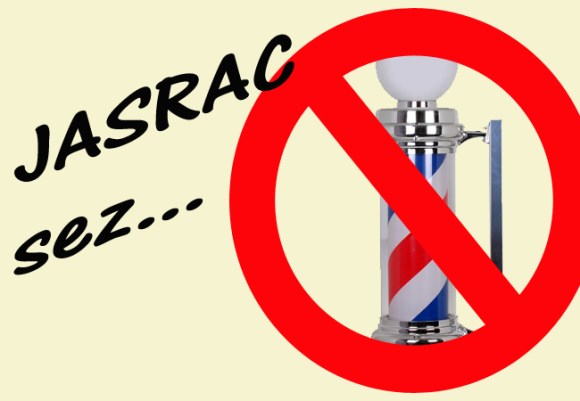
Let that be a lesson to anyone who dares play a CD in a place where it might be overheard by someone else.
Everyday they bleed hardworking artists dry with their reckless ways. Knowing full well that they are depriving the world of its culture for their own selfish gains, they insist on virtually reaching into the pocket of struggling musicians and robbing them of their money while exploiting their gifts.
Yes, barbershops have been a plague on the music industry since time immemorial. By playing a CD while they cut hair to an average of two people per hour, they are costing the music industry billions of millionths of yen every year. However, no one has ever challenged them because they have scissors and other pointy stuff.
At least no one has until now. Thanks to the brave men and women of the Japan Society for Rights of Authors, Composers, and Publishers (JASRAC), a crucial first blow has been given to these small businesses who, despite no longer using leeches, still manage to suck the very life-blood of Japanese culture.
On 19 March the Sapporo District Court ruled in favor of JASRAC and ordered the manager of a local barbershop to pay 31,000 yen (US$291) for the use of dozens of jazz songs on a portable music player running inside his shop from 2014 to 2017. The fiendish manager at first tired to resist, claiming that all of the songs in question had their copyright expired. However, he was no mach for the legions of heroes working at JASRAC who could identify 90 percent of the music as songs that they manage.
Online Japanese citizens sang the praises of JASRAC – after paying for the rights to sing it of course. Reading the comments, it may sound like they don’t actually like JASRAC, but they’re just being coy. Trust me, they’re all totally on-board with this.
“It used to be that hearing a song by chance could make people a new fan and customer of artists. Not any more, I guess.”
“If the actual artist filed a complaint, I would be okay with this. But this money is just going into the JASRAC budget, so no justice has been served.”
“Are these guys for real?! They won’t stop until all music is silenced from public spaces.”
“Who cares about music? They need to do something about these manga sites that are currently killing that industry.”
“Is their goal to destroy our culture?”
“Garbage organization. The irony is that they’ll drive themselves out of business if they succeed.”
“Them going after music schools is kind of understandable since those places make money directly from song selection. But who cares about the music in a barbershop?”
Well, that last comment clearly doesn’t have their finger on the pulse of things. I think we can all agree that the music playing in the background is the very first thing any of us considers when choosing a place to get our hair cut or styled.
I, for one, simply refuse to enter any barbershop unless it’s playing some obscure jazz music, and I abhor any shop that exploits these musicians by purchasing their music with the sole purpose of bringing in customers like myself (i.e. everyone).
So it is with great happiness that I announce this victory for Japan’s copyright society against that wicked barber. If JASRAC continues this path to glory, despite others’ attempts to thwart them, then we can finally live in a world where music cannot be uttered or heard by anyone unless a fee is paid.
The only exception of course will be those songs with the ukulele, xylophone, and a person whistling that you hear in every generic YouTube and crowdfunding video.
You’re listening to the future of music, my friends. I’m as sure of this as my therapist is that I use sarcasm as a way to express anger.
Source: Yahoo! News Japan, Hachima Kiko
Top image: Wikipedia/Kappersproducten.nl (Edited by SoraNews24)